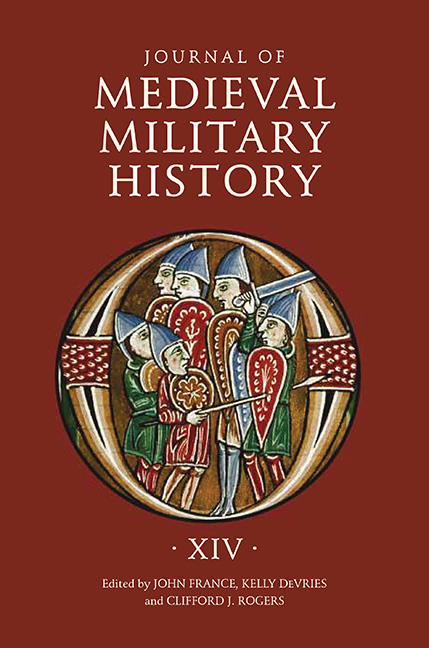Book contents
- Frontmatter
- Contents
- 1 Anglo-Norman Artillery in Narrative Histories, from the Reign of William I to the Minority of Henry III
- 2 Imperial Policy and Military Practice in the Plantagenet Dominions, c. 1337–c. 1453
- 3 The Parliament of the Crown of Aragon as Military Financier in the War of the Two Pedros
- 4 Chasing the Chimera in Spain: Edmund of Langley in Iberia, 1381/82
- 5 Note: A Medieval City under Threat Turns Its Coat, while Hedging Its Bets – Burgos Faces an Invasion in Spring 1366: Introduction and Translation
- 6 Medieval European Mercenaries in North Africa: The Value of Difference
- 7 Medieval Irregular Warfare, c. 1000–1300
- 8 Muslim Responses to Western Intervention: A Comparative Study of the Crusades and Post-2003 Iraq
- 9 “New Wars” and Medieval Warfare: Some Terminological Considerations
- 10 Friend or Foe? The Catalan Company as Proxy Actors in the Aegean and Asia Minor Vacuum
- List of Contributors
- Journal of Medieval Military History
- De Re Militari and the Journal of Medieval Military History
3 - The Parliament of the Crown of Aragon as Military Financier in the War of the Two Pedros
Published online by Cambridge University Press: 12 September 2017
- Frontmatter
- Contents
- 1 Anglo-Norman Artillery in Narrative Histories, from the Reign of William I to the Minority of Henry III
- 2 Imperial Policy and Military Practice in the Plantagenet Dominions, c. 1337–c. 1453
- 3 The Parliament of the Crown of Aragon as Military Financier in the War of the Two Pedros
- 4 Chasing the Chimera in Spain: Edmund of Langley in Iberia, 1381/82
- 5 Note: A Medieval City under Threat Turns Its Coat, while Hedging Its Bets – Burgos Faces an Invasion in Spring 1366: Introduction and Translation
- 6 Medieval European Mercenaries in North Africa: The Value of Difference
- 7 Medieval Irregular Warfare, c. 1000–1300
- 8 Muslim Responses to Western Intervention: A Comparative Study of the Crusades and Post-2003 Iraq
- 9 “New Wars” and Medieval Warfare: Some Terminological Considerations
- 10 Friend or Foe? The Catalan Company as Proxy Actors in the Aegean and Asia Minor Vacuum
- List of Contributors
- Journal of Medieval Military History
- De Re Militari and the Journal of Medieval Military History
Summary
One of the most memorable speeches in American presidential history was that delivered on December 8, 1941, when Franklin D. Roosevelt demanded a declaration of war against Japan before a joint session of Congress. What the president demanded from the legislature was not only a formal recognition of the war's existence, but an open-ended though unstated pledge of assistance – especially of the financial sort – until the conflict came to a military or diplomatic conclusion. Though remarkable in the governmental history of the United States, such calls for money to fight wars were quite normal in the British “mother of parliaments” and in other medieval assemblies. To review how one set of later medieval parliamentary institutions came to the aid of its embattled king, this paper will explore the repeated efforts of the estate assemblies of Aragon and Valencia (Cortes) and Catalonia (Corts) in support of the crafty statesman, Pere III [Pedro IV] (r. 1336–87), during the largest conflict between the polities of Christian Spain, the later-named War of the Two Pedros (1356–66).
Like all parliamentary assemblies of the medieval world, those of the Crown of Aragon sprang from the royal court, that ill-defined collection of noble and ecclesiastical advisers along with the king's relatives and body servants. When the count of Barcelona or the king of Aragon or Valencia needed either “advice” (consilium) or “aid” (auxilium) – this usually meant soldiers or the money to pay for them – he summoned his churchmen, nobles, and townsmen to meet in an expanded session of his court. This “full,” “distinguished,” “praiseworthy,” “solemn,” or “general court” was called into existence by the king and after it had acceded to the king's wishes, it was adjourned and ceased to be, having existed only as an “occasion, an occurrence, and not yet a separate court.” Despite this shadow life, the national assemblies of eastern Spain became important adjuncts to the long periods of war against Islam practiced by the great reconquest warrior, Jaume I (Jaime I) (r. 1214–76). By the end of his life, such meetings functioned in all of his peninsular territories of Aragon, Catalonia, and Valencia, and by 1287 they had all gained legal recognition of their existence.
- Type
- Chapter
- Information
- Journal of Medieval Military HistoryVolume XIV, pp. 57 - 78Publisher: Boydell & BrewerPrint publication year: 2016

